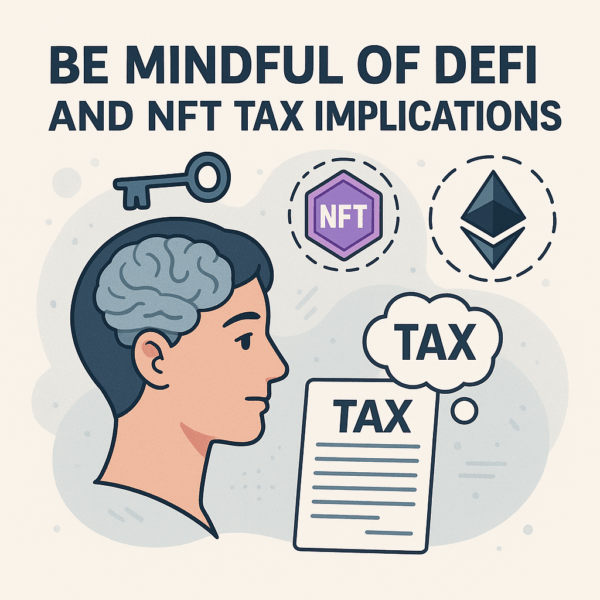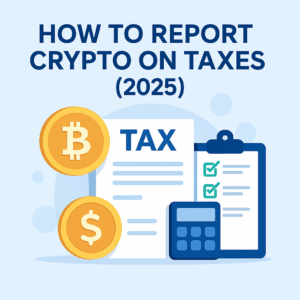How to Avoid Paying Too Much Tax on Crypto (2025)
By Jason Miller – Crypto Writer 10.expert 🧠 Covering Bitcoin, altcoins, blockchain & Web3.
As a crypto writer and analyst, one of the most common anxieties I hear from people entering or deepening their involvement in the digital asset space isn’t about market volatility, but about taxes. The fear of paying too much, or worse, getting it wrong, can be a significant barrier. With the IRS (and other global tax authorities) increasing their scrutiny and new reporting requirements like Form 1099-DA coming into effect for the 2025 tax year, it’s more crucial than ever to understand how to optimize your crypto tax strategy legally.
The good news is that just like traditional investments, there are legitimate strategies you can employ to minimize your tax liability on crypto. It’s not about evasion, but about smart, proactive planning and leveraging the rules to your advantage. Every dollar saved on taxes is a dollar that can be reinvested into your portfolio.
Let’s dive into how to avoid paying too much tax on crypto for the 2025 tax year.
How to Avoid Paying Too Much Tax on Crypto (2025): Smart Strategies for Your Digital Portfolio 🚀💸
Don’t let taxes eat into your crypto gains. Strategic planning can significantly reduce your tax burden.
Prioritize Long-Term Capital Gains 📅
- The Golden Rule: This is arguably the most impactful strategy. Crypto held for more than one year and a day before being sold, traded, or spent qualifies for significantly lower long-term capital gains tax rates (0%, 15%, or 20% federally, depending on your income).
- Avoid Short-Term: Assets held for one year or less are taxed at your ordinary income tax rates, which can be as high as 37%. HODL for the long term not just for market appreciation, but for tax efficiency.
Master Tax Loss Harvesting 🚜
- Offset Gains: If you have crypto assets that have depreciated in value (“unrealized losses”), you can “realize” these losses by selling them. These capital losses can then be used to offset any capital gains you’ve incurred during the year.
- Offset Ordinary Income: If your capital losses exceed your capital gains, you can deduct up to $3,000 of the remaining loss against your ordinary income annually. Any excess losses can be carried forward indefinitely to offset future gains or income.
- No Wash Sale Rule (Currently): A significant advantage for crypto is that, unlike traditional stocks, the IRS’s “wash sale” rule (which prohibits claiming a loss if you repurchase a substantially identical security within 30 days) does not currently apply to crypto. This allows you to sell at a loss and immediately buy back the same asset to maintain your position, if you believe in its long-term potential. However, keep an eye on potential future legislative changes regarding this.
Strategic Cost Basis Accounting Methods 📊
- Post-2025 Changes: Starting January 1, 2025, the IRS mandates a “per-wallet” or “per-account” cost basis tracking. While FIFO (First-In, First-Out) is the default if you don’t specify, other methods can reduce your tax bill.
- HIFO (Highest-In, First-Out): This method assumes you sell the crypto units with the highest cost basis first. In a rising market, HIFO often results in the lowest taxable gain, as you’re claiming the highest acquisition costs against your proceeds.
- Specific Identification: This method allows you to choose which specific crypto unit (or “tax lot”) you are selling. This requires meticulous record-keeping, but when implemented correctly, it allows for the most control over your tax outcome. Note: For 2025, specific identification must be done at or before the time of sale, not retroactively at year-end.
- Leverage Crypto Tax Software: Good crypto tax software will allow you to choose and apply these different cost basis methods to optimize your tax liability.
Time Your Disposals Wisely ⏰
- Year-End Review: Review your portfolio before December 31st each year. Identify unrealized losses for tax loss harvesting.
- Low-Income Years: If you anticipate a year with lower overall taxable income (e.g., sabbatical, career change), it might be an opportune time to realize some capital gains, as you may fall into a lower capital gains tax bracket.
Donate Crypto to Charity ❤️
- Tax-Efficient Giving: Donating crypto directly to a qualified 501(c)(3) charity can be highly tax-efficient.
- No Capital Gains Tax: You avoid paying capital gains tax on the appreciated crypto you donate.
- Deduction: You can typically deduct the fair market value of the crypto (if held for over a year) as a charitable contribution, up to certain AGI limits.
- Direct Donation: Ensure you donate directly to the charity, not sell the crypto and then donate the cash.
Gift Crypto Strategically 🎁
- Gift Tax Exclusion: Gifting crypto (within the annual gift tax exclusion limits, $19,000 per recipient for 2025) is generally not a taxable event for the giver or receiver.
- Reduce Future Taxable Estate: For high-net-worth individuals, gifting crypto can be a way to reduce the size of your taxable estate.
- Recipient’s Basis: The recipient takes your original cost basis. If they then sell it, they’ll pay capital gains based on that original basis. This can be useful if the recipient is in a lower tax bracket than you.
Utilize Tax-Advantaged Retirement Accounts (Crypto IRAs) retirement
- Self-Directed IRA: You can hold crypto within a Self-Directed Individual Retirement Account (IRA) or Solo 401(k).
- Tax-Deferred/Tax-Free Growth:
- Traditional IRA: Contributions may be tax-deductible, and growth is tax-deferred until retirement.
- Roth IRA: Contributions are after-tax, but qualified withdrawals in retirement are entirely tax-free, including all crypto gains. This is a powerful strategy for long-term crypto investors.
Be Mindful of DeFi and NFT Tax Implications 🧠

- Income vs. Capital Gains: Clearly distinguish between activities that generate ordinary income (staking rewards, airdrops, yield farming interest when received) and those that trigger capital gains (selling/trading NFTs, swapping LP tokens).
- NFTs as Collectibles: Some NFTs may be classified as “collectibles,” potentially subject to a higher long-term capital gains rate of 28%. The IRS uses a “look-through” analysis based on what the NFT represents. Be aware of this if you’re dealing with art, sports collectibles, or similar NFTs.
- Gas Fees: Remember that gas fees (transaction costs) incurred when buying or selling crypto/NFTs can often be added to the cost basis of the asset, reducing your taxable gain.
Document Everything Meticulously ✍️
- Transaction Records: Keep detailed records of every crypto transaction, including dates, amounts, acquisition costs, sale proceeds, and wallet addresses.
- Supporting Documents: Store records of any income received (mining, staking, airdrops) and their fair market value at the time of receipt.
- Proof is Power: Good record-keeping is your best defense in case of an IRS audit and is essential for utilizing advanced tax strategies. Crypto tax software can automate much of this.
Avoid Taxable Events Unnecessarily 🛑
- HODL: Simply holding crypto in your wallet, even if its value skyrockets, is not a taxable event until you dispose of it.
- Internal Transfers: Moving crypto between your own wallets or exchanges is not a taxable event.
Account for Transaction Fees and Gas 💲
- Deductible Expenses: Fees paid for transactions (trading fees, network gas fees) often increase your cost basis or reduce your proceeds, thereby reducing your capital gains. Ensure your tax software correctly accounts for these.
Consider Becoming a “Trader” (Complex) 💼
- Mark-to-Market Election: For very active traders, electing “mark-to-market” accounting (under Section 475(f)) can allow you to treat capital losses as ordinary business losses, which are fully deductible against ordinary income (without the $3,000 limitation). This is a complex election with strict rules and should only be considered with a highly qualified crypto tax professional.
Seek Professional Crypto Tax Advice 🧑💼
- Evolving Landscape: Crypto tax laws are complex and frequently updated. A qualified tax accountant specializing in digital assets can help you navigate the nuances, apply the best strategies for your specific situation, and ensure compliance.
- Complex Situations: This is especially true if you’re involved in extensive DeFi activities, have high transaction volume, or significant gains.
Stay Informed on Regulatory Changes 📰
- Form 1099-DA: Be ready for exchanges to issue the new Form 1099-DA for 2025 transactions. This will give the IRS more direct visibility into your crypto activity, making proactive tax planning and accurate reporting even more vital.
- New Legislation: Keep an eye on any new legislative proposals that could impact crypto tax treatment (e.g., potential changes to the wash sale rule).
Don’t Forget State Taxes 📍
- Varying Rules: Remember that state income tax laws also apply on top of federal taxes, and some states might have specific guidance on crypto. Factor these into your overall tax planning.
By proactively adopting these strategies and maintaining diligent records, you can significantly reduce your crypto tax burden for the 2025 tax year and beyond, allowing you to keep more of your hard-earned digital assets.








